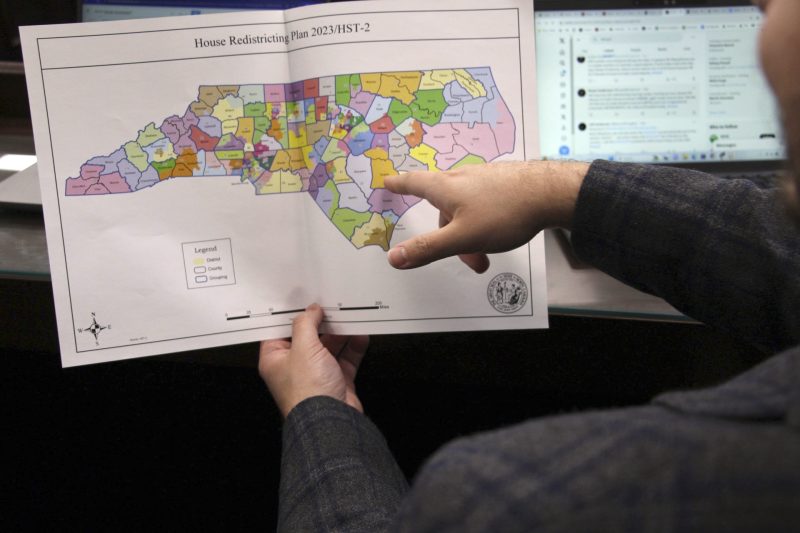Daughter of prominent Palestinian poet killed in Israeli airstrike in Gaza
Court rejects claim challenging North Carolina map for diluting Black vote


A federal appellate court on Thursday rejected an emergency challenge to North Carolina’s Republican-drawn legislative map, all but ensuring elections will go forward this year under contested lines drawn up in late 2023 that Democrats and voting rights advocates say were created to weaken Black representation.
That means 2024 elections will go forward with a map experts say will help Republicans retain a supermajority in the state legislature that can block North Carolina’s Democratic governor from vetoing bills. The new maps are also expected to give Republicans at least three more seats in Congress. There are challenges in federal court to those changes as well, but none with a chance at being heard before this fall’s elections, for which primaries have already occurred.
“The election is … happening right now,” Judge Allison Jones Rushing wrote for herself and J. Harvie Wilkinson III. They agreed with U.S. District Judge James C. Dever III that these maps did not create “the extraordinary circumstances necessary for a preliminary injunction that would disrupt the status quo and compel the race-based sorting of voters for the 2024 Senate elections.”
The case was heard first by a George W. Bush appointee who represented Republicans in North Carolina redistricting disputes before becoming a judge, and then by a panel of three judges on the U.S. Court of Appeals for the 4th Circuit that included two GOP nominees. The ruling comes the same day a federal court in South Carolina ruled that state could hold this year’s elections under a map the same judges had declared an unconstitutional racial gerrymander, because an appeal is still pending in the Supreme Court.
This cycle is the first time North Carolina is drawing new maps after two key, seemingly contradictory Supreme Court rulings. In the first, from 2013, the court said places with a history of racial discrimination no longer need approval from the Justice Department or federal court to change district lines. But last year, the court surprised observers by ruling that states still cannot draw lines that prevent minority voters from electing their preferred candidates.
Republicans in North Carolina argued, and Dever agreed, that the new lines were drawn with partisanship in mind rather than race. The Supreme Court ruled in 2019 that gerrymandering that is partisan, not racial, is something federal courts have no power to correct.
Minority votes can be diluted in two ways — “packing” them into a small number of districts where they dominate or “cracking” them across several where they have little sway. In past cases, the 4th Circuit and the Supreme Court have ruled that North Carolina Republicans illegally “packed” Black voters into the fewest possible districts to limit their voting power. Dever used those decisions to argue that the GOP cannot now be faulted for “cracking” the state’s Black Belt in a way that leaves no seat in the area with a Black majority.
“Instead of making that same mistake,” Dever wrote, this time Republican leaders “did not have race in the computer.” He added that evidence of racial animus in the state is “outdated” or unconvincing, as is evidence of racially polarized voting, because both White and Black voters show no particular loyalty toward candidates of their own race.
Nicholas Stephanopoulos, a voting rights expert at Harvard University, said that’s not how the law works. “It’s way too simplistic to say, ‘Because on a certain fact pattern a decade ago, one or two particular districts were found to have a predominantly racial purpose; therefore, North Carolina never has to consider race again when it’s redistricting’ — one doesn’t follow at all from the other,” he said. Under the Voting Rights Act, states cannot engage in racial gerrymandering — unless there is evidence that a White majority regularly defeats the candidates preferred by a minority group.
If that is the case, Stephanopoulos said, “the motives or the data that the line-drawers used are irrelevant.” Minority votes must then be protected either through majority-minority districts or “crossover” districts where enough White voters support minority-backed candidates.
The ruling drew a sharp dissent from Judge Roger L. Gregory, who warned that the ruling further weakened the voting rights protections already diminished in recent years by the Supreme Court.
“A conclusion that polarization is explained by partisan affiliation is not a conclusion that polarization is not explained by race,” he said. “… Permitting evidence of partisan motivation to explain away racial polarization converts Black voters’ motivations for voting into an impediment to Black voting power.”
Gregory, who in 2001 became the first Black judge on the 4th Circuit, said Dever “went out of [his] way to minimize the racial appeal” in Republican campaigns from as recently as 2020, “defying common sense.”
He agreed with the advocates that a new primary could and should be held in versions of the two state Senate districts that are similar to how they looked before redistricting. (Neither seat was contested when primaries were held on March 5).
Rushing said that the fact that the groups challenging the map took a month to file their lawsuit undercut any argument for urgency, and that the evidence was too ambiguous to justify intervention before a full trial. Voting rights activists say the Republicans who control the state legislature intentionally waited until October to put out the maps, with only a week of comment beforehand, making it harder to mount challenges before the election.
“They did it all behind closed doors; we had to go back and figure out what they did,” said Hilary Klein, an attorney for the Southern Coalition for Social Justice.
North Carolina’s Supreme Court ruled in 2019 that drawing districts for political advantage violated the state constitution’s commitment to free and fair elections. But when Republicans took control of the court last year, they threw out that ruling, saying that “courts are not intended to meddle in policy matters.”
Paul Shumaker, a senior Republican consultant in North Carolina, said while the ruling will have a direct effect on this year’s election, he doesn’t expect the legal challenge to go away.
“It is just the final page of one chapter of one book in the ongoing saga of gerrymandering and redistricting in North Carolina,” he told The Washington Post.
“They’re going to write a new chapter starting now,” he said of opponents of the latest redistricting map.











